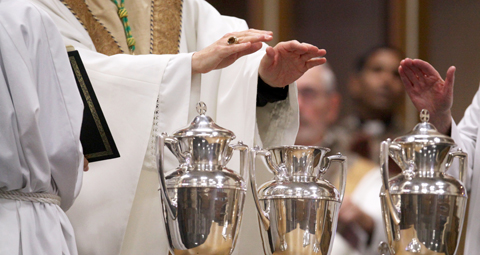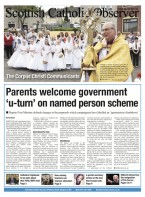April 14 | ![]() 0 COMMENTS
0 COMMENTS ![]() print
print

Priests should ‘live with the smell of the sheep’
This week, THE THE BOW IN THE HEAVENS reflects on the Chrism Mass, the Easter Triduum and the Pope’s advice to the priesthood — By Fr JOHN BOLLAN
FROM where I’m sitting, the Great Week, as Holy Week is sometimes called, tends to be a curious mix of frenetic activity and pauses filled with stark silence. My own Holy Week began by being liberated from my on-call stint for the hospital: there’s always a spring in my step once the phone has been handed over to the next priest on the rota, usually Fr Callaghan up in Port Glasgow.
These days of Holy Week are also busy with all day Confessions at various locations around the diocese and it’s heartening to witness the tremendous turn-out of those seeking to make a clean breast of things before Easter. It gives one a brief glimpse into those days, now long past, when older priests would tell of the rows and rows of folk queuing up for Confessions on a Saturday morning. There is a trade-off in matters penitential, I suppose: fewer folk waiting to enter the Confessional means you have more time, if desired, to talk with the person on the other side of the grille. When there’s a lengthy queue, however, you’re mindful both of those waiting patiently outside and their rising anxiety levels at the possibility they’re in line—literally—for a grilling.
The most important thing, though, is that everyone who enters the Confessional feels lighter on leaving it.
Wednesday evening saw one of the highlights of our year, the diocesan Chrism Mass, which is always a busy and joyful celebration. As a priest, it’s nice to be affirmed by the people, even as one is reaffirming one’s priestly commitment: there are always faces from the past, former parishioners smiling—and even waving—from the congregation as we process from the cathedral. While this renewal of commitment is an uplifting element of Holy Week, attendance is not strictly mandatory for us.
Sometimes priests cannot attend for a number of reasons and folk should not infer anything from their absence. I once knew a lady who would spend the bus journey back from the Chrism Mass ticking off the clergy attendees in the Western Catholic Calendar: “Myra, did you see Fr So-and-So? No? I thought that…”
Her anxious expression gave away the fact that the absent Fr So-and-So had just been added to a mental watch-list for extra prayers. It didn’t matter that I explained my absent confreres were probably on-call or otherwise engaged, it never wholly assuaged her concern that their chasubles were on a shaky nail.
Of course, the other purpose of the Chrism Mass is to obtain a fresh supply of holy oils for the next year—especially the precious Chrism from which the Mass takes its name. There is always a connection—not least because the celebrations often follow on from each other—between the Mass of Chrism and the Mass of the Lord’s Supper, both of which highlight different aspects of the priesthood of Christ which has been entrusted to the Church.
I think that Pope Francis has yet to offer a more fruitful meditation on the priesthood than the homily at his first Chrism Mass as Bishop of Rome, in which he memorably called for priests to be living ‘with the smell of the sheep.’ He spoke of the anointing of priests with Chrism as not intended purely to make us fragrant, but that this oil—and the life consecrated with it—should be poured out in generous service of the people.
Having said that, although in my less joyful moments when I’ve reflected that the fragrance of the flock is not my perfume of choice, I like to remind myself that the smell of the sheep is Chrism. All the Baptised have been anointed with this mix of oil and balsam: the underlying bouquet of the Christian life is a fragrance which no subsequent ‘smells’ can wholly eradicate or overpower.
That’s why I asked for a wee bit of extra Chrism this year, as I have just exhausted the supply allocated to me at the last Mass: whenever I’m Baptising a child, I liberally coat the new Christian’s head with the oil and point out to the family that their child will smell of the sweetness of Christ for the rest of the day— but that’s a good thing, a precious thing. I’ve caught quite a few guests having a furtive sniff of the wean, but that’s also a good thing. Catholicism should be a sensory experience.
Catholicism’s appeal to the senses is emphasised by the deliberate starkness of the Triduum, especially the transition from Holy Thursday to Good Friday. The stripped altar, the empty tabernacle and font, the absence of flowers and light: it’s as though the life drains out of the Church, just like the Holy Water poured away into the earth. Or, to use another, more contemporary analogy I used with the schoolkids recently, on Good Friday the Church is like a television in ‘standby mode.’
The screen goes black, with no movement or colour; to all intents and purposes it has been switched off, but there is just the merest light hinting at the power waiting to surge through it once again.
And what power! The Easter Vigil is my favourite liturgy, even though it is that wee bit more complex than any of the others. I make a point of singing the Easter Proclamation (the Exultet), or, as I always disclaim for legal purposes, my approximation of it.
Not being able to read music, I have to rely on a CD recording which I play repeatedly in the days leading up to Holy Saturday. So, I more or less get it right: I may occasionally go up when I should go down (and vice versa), but it’s generally considered a recognisable rendition of this lovely text.
Even better, the fact that each year’s rendering is a bit different from the previous one means that I can advertise it as the ‘2017 edition.’ I may not be Gary Barlow or a Tom Jones, but my Exultet does draw together a dedicated fanbase from around the country (OK, that’s an exaggeration, but there are pensioners in the high flats who never miss a performance, even though they normally won’t venture out after dark).
I know that recently there’s been a kerfuffle around the airbrushing of the word ‘Easter’ from certain confectionary products. Being a man of principle, I’ve struck a blow for Christian chocolate by getting the altar servers only Real Easter Eggs this year.
As well as a mild sugar rush, they also get the real story behind this season. Also, since part of the Easter airbrushing controversy also involved the National Trust, I was interested to note that the Woodland Trust are encouraging us to forget Easter eggs altogether and sponsor the planting of Easter trees instead (there’s also a campaign by the similarly named Worldland Trust to do so the same, but in Ecuador).
A bit of me likes that idea: it chimes with the repurposed palms I wrote about last week and echoes that line in the Edwin Muir poem The Transfiguration about the cross which ‘cures its hurt and grows into a tree/In a green springing corner of young Eden.’
If you’re reading this on Easter Sunday, I hope you’ve had a blessed Triduum and that the Easter Season brings you every blessing. However we spend the Paschal festivities— and I for one shall be taking a couple of days break after a decidedly funeral-heavy Lent—as the prayer accompanying the lighting of the Paschal candle puts it, ‘may the light of Christ, rising in glory, dispel the darkness of our hearts and minds.’ Gaudia Paschalia! Happy Easter, especially to all the new Catholics in our midst!











